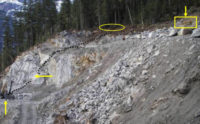Canada is set to begin using a deferred prosecution agreement (DPA), effective Jan. 1, for companies charged with criminal misconduct—potentially allowing them to avoid a big financial fallout from criminal convictions in exchange for hefty fines and internal reforms.
The DPA approach is a major boost to Montreal design-build giant SNC-Lavalin, which is facing criminal charges stemming from alleged overseas bribery by past executives, which the firm self-reported.
The firm, a vocal proponent of such pacts, which are similar to legal tools in the U.S., France and the U.K., says looming criminal charges have cost it work internationally.
Under the DPA, the charges could be dropped over a period of time.
Canadian agency Public Services and Procurement Canada said the option for prosecutors to use a DPA is a big step forward for Canada.
It previously had to secure a criminal conviction against a company in order to extract financial penalties, says John Boscariol, a partner in Toronto law firm McCarthy Tétrault and head of its international trade and investment group.
"From a company's point of view, criminal convictions can be deadly," Boscariol says, noting lost government-contract and other business opportunities and the resulting economic impact.
SNC-Lavalin was charged in 2015 with fraud and bribery charges stemming from alleged payoffs by the since-fired executives to Libyan officials for contracts.
Since then, the firm has made sweeping changes to its executive suite while instituting internal ethics reforms aimed at preventing corruption.
There is no deal yet between SNC-Lavalin and federal authorities on the pending Libyan charges, as well as others involving construction of a Montreal hospital. But observers said the DPA announcement, which would allow the company to settle with the government without admitting wrongdoing, represents a major step in that direction.
The firm has pleaded not guilty to the one fraud and one corruption charge filed by the Royal Canadian Mounted Police against the parent corporation and two subsidiaries.
Separately, a Quebec Superior Court judge ruled April 6 that the trial of former SNC-Lavalin Vice President Sami Abdellah Bebawi, who is charged with bribing Libyan government officials in relation to a water-pipeline construction contract the firm was awarded, will proceed in April 2019. Bebawi worked for the firm until 2006 and was a consultant until 2011.
Bebawi, who had been charged in 2014, filed a motion last year claiming he had waited too long for his trial and suffered hardships, even though he had been given the option of a trial start for this year, says the Montreal Gazette.
For SNC-Lavalin, the DPA "removes the legal overhang on the company," said Maxim Sytchev, construction industry analyst at National Bank of Canada. "If it is able to fully turn the leaf, that is where it becomes a clean slate from a reputation perspective."
Sytchev said that financial markets would accept a settlement below $234 million without major reverberations for the company, but its ability to move beyond the bribery charges is hard to fully calculate. "I don't want to say any amount is irrelevant but turning the page is critical," he said in a research note.
A bribery conviction would make it much harder for SNC-Lavalin to do business with public agencies across the world. Boscariol says the DPA would promote more internal policing and reporting of misconduct.
Canada's Parliament must still approve the DPA, but it is set to take effect 90 days after the proposed 2019 federal budget is passed, according to Public Services and Procurement Canada.
The Canadian DPA follows three months of hearings last year.
SNC-Lavalin declined to comment. But in a February release of results for 2017, CEO Neil Bruce noted unspecified "alternatives" the firm could take if the government rejected the DPA, although he said the DPA approach was preferred.
Bruce declined to comment to analysts on whether the proposed DPA would defer or end an upcoming trial on pending charges. Said Bruce: "We're not in control of that."



Post a comment to this article
Report Abusive Comment